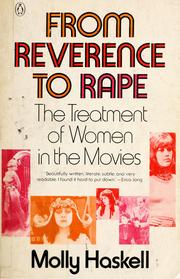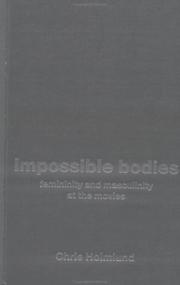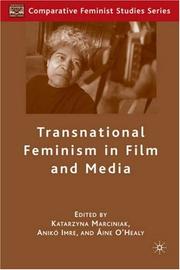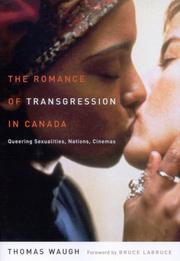| Listing 1 - 10 of 93 | << page >> |
Sort by
|
Book
ISBN: 1474453600 1474430325 1474430317 9781474430319 9781474430326 9781474430296 1474430295 9781474453608 9781474430302 Year: 2020 Publisher: Edinburgh Edinburgh University Press
Abstract | Keywords | Export | Availability | Bookmark
 Loading...
Loading...Choose an application
- Reference Manager
- EndNote
- RefWorks (Direct export to RefWorks)
In the first extended study into the politics of whiteness inherent within postfeminist cinema, Kendra Marston interrogates representations of melancholic white femininity in contemporary Hollywood cinema, arguing that the 'melancholic white woman' serves as a vehicle through which to explore the excesses of late capitalism and a crisis of faith in the American dream. This figure may be idealised or scapegoated within these films, yet strategic performances of gendered melancholia may produce benefits for white female directors and stars disadvantaged within a patriarchal industry. Examining film genres including the tourist romance, the fantasy film and the psychological thriller, the book also contains case studies of films like 'The Virgin Suicides,' 'Blue Jasmine,' 'Gone Girl' and 'The Girl on the Train.'
Feminism and motion pictures. --- Women, White, in motion pictures. --- Melancholy in motion pictures. --- Motion pictures --- White women in motion pictures --- Motion pictures and feminism --- Film --- Feminism --- Movies --- Popular culture --- Images of women --- Féminité --- Whiteness --- Book

ISBN: 0140039465 9780140039467 Year: 1974 Publisher: New York Penguin Books
Abstract | Keywords | Export | Availability | Bookmark
 Loading...
Loading...Choose an application
- Reference Manager
- EndNote
- RefWorks (Direct export to RefWorks)
Sociology of the family. Sociology of sexuality --- Film --- History --- Women in motion pictures --- Rape in motion pictures --- CDL --- 791.43 --- Motion pictures --- Movies --- Images of women --- Book
Multi
ISBN: 9783319661698 9783319661704 3319661701 Year: 2017 Publisher: Cham Palgrave MacMillan
Abstract | Keywords | Export | Availability | Bookmark
 Loading...
Loading...Choose an application
- Reference Manager
- EndNote
- RefWorks (Direct export to RefWorks)
This book offers a critical survey of film and media representations of black masculinity in the early twenty-first-century United States, between President George W. Bush’s 2001 announcement of the War on Terror and President Barack Obama’s 2009 acceptance of the Nobel Peace Prize. It argues that images of black masculine authority have become increasingly important to the legitimization of contemporary policing and its leading role in the maintenance of an antiblack social order forged by racial slavery and segregation. It examines a constellation of film and television productions—from Antoine Fuqua’s Training Day to John Lee Hancock’s The Blind Side to Barry Jenkin's Moonlight—to illuminate the contradictory dynamics at work in attempts to reconcile the promotion of black male patriarchal empowerment and the preservation of gendered antiblackness within political and popular culture.
racisme --- politie --- Movies --- Violence --- Masculinity --- Racism --- Book --- anno 2000-2009 --- anno 2010-2019 --- United States of America --- African American men in motion pictures. --- Race relations in motion pictures. --- Patriarchy in motion pictures. --- Motion pictures --- Social aspects.
Multi
ISBN: 9090091106 Year: 1996 Publisher: Amsterdam Universiteit Amsterdam
Abstract | Keywords | Export | Availability | Bookmark
 Loading...
Loading...Choose an application
- Reference Manager
- EndNote
- RefWorks (Direct export to RefWorks)
Voor haar proefschrift, dat hier in boekvorm voorligt, vertrok film- en theatertheoretica Van Schermbeek van de vraag waarin een vrouw zichzelf herkent wanneer ze geniet van een roman, een film of een toneelstuk. Zij gaat voor deze analyse van de vrouwelijke lees- en kijklust de dialoog aan met het toonaangevende werk van Teresa de Lauretis. Maar ze gaat ook nader in op niet-feministische theorieën, zoals die van Vladmir Propp, Claude Lévi-Strauss en Juri Lotman.
Theses --- Feminism and motion pictures. --- Feminist theory. --- Heroes in motion pictures. --- Women in motion pictures. --- Women --- Identity. --- Sociology of culture --- Developmental psychology --- Film --- Semiotics --- Mass communications --- Depth psychology --- Feminism and motion pictures --- Feminist theory --- Heroes in motion pictures --- Women in motion pictures --- Female identity --- Feminine identity --- Identity (Psychology) --- Motion pictures --- Feminism --- Feminist philosophy --- Feminist sociology --- Theory of feminism --- Motion pictures and feminism --- Identity --- Philosophy --- Comparative literature --- Psychological study of literature --- Movie review --- Identification --- Viewing habits --- Mythology --- Psychoanalysis --- Rituals --- Féminité --- Book

ISBN: 0415185769 Year: 2002 Publisher: London Routledge
Abstract | Keywords | Export | Availability | Bookmark
 Loading...
Loading...Choose an application
- Reference Manager
- EndNote
- RefWorks (Direct export to RefWorks)
Body, Human, in motion pictures --- Sex role in motion pictures --- Minorities in motion pictures --- Minorities in films --- Motion pictures --- Human body in motion pictures. --- Minorities in motion pictures. --- Sex role in motion pictures. --- Developmental psychology --- Film --- Sociology of minorities --- Sociology of the family. Sociology of sexuality --- Human physiology --- Sexology --- Human body in motion pictures --- Movies --- Homosexuality --- Latinas --- Female homosexuality --- Body --- Masculinity --- Images of women --- Féminité --- Book

ISBN: 1403983704 9781403983701 9780230338142 1349539104 9786611915353 1281915351 0230609651 9780230609655 Year: 2007 Publisher: New York Palgrave MacMillan
Abstract | Keywords | Export | Availability | Bookmark
 Loading...
Loading...Choose an application
- Reference Manager
- EndNote
- RefWorks (Direct export to RefWorks)
This collection of interdisciplinary essays examines current cinematic and media landscapes from the perspective of transnational feminist practices and methodologies. Focusing on film, media art, and video essays, the contributors chart innovative strategies for exploring contemporary visual cultures.
Feminism and motion pictures. --- Women in motion pictures. --- Women in motion pictures --- Feminism and motion pictures --- Film --- Music, Dance, Drama & Film --- Social Change --- Sociology & Social History --- Social Sciences --- Motion pictures and feminism --- Motion pictures --- E-books --- Sociology of culture --- Demography --- Transport. Traffic --- Movies --- International --- Migration --- Mobility --- Popular culture --- Book --- Imaging

ISBN: 1282867245 9786612867248 0773576800 9780773576803 077353069X 0773531467 9780773530690 9780773531468 0773585281 Year: 2006 Publisher: Montreal McGill-Queen's University Press
Abstract | Keywords | Export | Availability | Bookmark
 Loading...
Loading...Choose an application
- Reference Manager
- EndNote
- RefWorks (Direct export to RefWorks)
From pornography to autobiography, from the Cold War to the sexual revolution, from rural roots and mythologies to the queer meccas of Vancouver, Toronto, and Montreal, The Romance of Transgression in Canada is a history of sexual representation on the large and small screen in English Canada and Quebec. Thomas Waugh identifies the queerness that has emerged at the centre of our national sex-obsessed cinema, filling a gap in the scholarly literature. In Part One he explores the explosive canon of artists such as Norman McLaren, Claude Jutra, Colin Campbell, Paul Wong, John Greyson, Patricia Rozema, Lea Pool, Bruce Labruce, Esther Valiquette, Marc Paradis, and Mirha-Soleil Ross. Part Two is an encyclopaedia of short essays covering 340 filmmakers, video artists, and institutions. The Romance of Transgression in Canada is both a scholarly account and a celebration of Canadian LGBTQ films - moving images that have scandalized conservative politicans, but are the envy of queer cultural festivals around the world.
Homosexuality in motion pictures. --- Gays in motion pictures. --- Lesbians in motion pictures. --- Motion pictures --- Cinema --- Feature films --- Films --- Movies --- Moving-pictures --- Audio-visual materials --- Mass media --- Performing arts --- History and criticism. --- History and criticism --- Sociology of the family. Sociology of sexuality --- Film --- History --- Canada --- Homosexuality --- Video --- Book --- Imaging --- Gay people in motion pictures.
Book
ISBN: 0252050487 9780252050480 9780252041815 9780252083433 025204181X 0252083431 Year: 2018 Publisher: Urbana, Ill. University of Illinois Press
Abstract | Keywords | Export | Availability | Bookmark
 Loading...
Loading...Choose an application
- Reference Manager
- EndNote
- RefWorks (Direct export to RefWorks)
Motion pictures and women --- Silent films --- Women in the motion picture industry --- Motion picture industry --- Moving pictures, Silent --- Silent motion pictures --- Motion pictures --- Women and motion pictures --- Women --- History. --- History --- anno 1900-1999 --- United States --- United States of America --- Movies --- Management --- Film directors --- Companies --- Actors --- Book

ISBN: 1403912424 1403912432 9781403912428 9781403912435 9786613184139 0230596339 1283184133 Year: 2006 Publisher: Basingstoke Palgrave MacMillan
Abstract | Keywords | Export | Availability | Bookmark
 Loading...
Loading...Choose an application
- Reference Manager
- EndNote
- RefWorks (Direct export to RefWorks)
Transgender on Screen werpt een blik op de culturele afbeeldingsvormen van travestie en transseksualiteit in moderne media en doet dit alles tegen een essentiële historische achtergrond. Hoe werden en worden cross-dressers en transseksuelen afgebeeld in drie verschillende filmgenres: komedies, trillers en mengvormen? Wat is de invloed van deze afbeeldingsvormen op het steeds problematischer wordende onderscheid tussen het ingebeelde en de realiteit? Deze analyse wordt gebaseerd op bevindingen uit de psychoanalyse, queer theorieën en post moderne theorieën.
Internet pornography. --- Transgender people in motion pictures. --- Transsexuals in motion pictures. --- Transvestism in motion pictures. --- Computer architecture. Operating systems --- Sociology of the family. Sociology of sexuality --- Developmental psychology --- Film --- Movies --- Transgender --- Pornography --- Cross-dressing --- Internet --- Book --- Imaging
Book
ISBN: 9780521173544 9780511740046 9781107001947 9781139078269 1139078267 9781139080552 1139080555 9781139070256 1139070258 0511740042 9781139082822 1139082825 1107001943 052117354X 1107220386 1139063642 1283111357 9786613111357 1139075993 9781107220386 9781139063647 9781283111355 661311135X 9781139075992 Year: 2011 Publisher: Cambridge Cambridge University Press
Abstract | Keywords | Export | Availability | Bookmark
 Loading...
Loading...Choose an application
- Reference Manager
- EndNote
- RefWorks (Direct export to RefWorks)
Virginia Woolf famously wrote 'as a woman I have no country', suggesting that women had little stake in defending countries where they are considered second-class citizens, and should instead be forces for peace. Yet women have been perpetrators as well as victims of violence in nationalist conflicts. This unique book generates insights into the role of gender in nationalist violence by examining feature films from a range of conflict zones. In The Battle of Algiers, female bombers destroy civilians while men dress in women's clothes to prevent the French army from capturing and torturing them. Prisoner of the Mountains shows a Chechen girl falling in love with her Russian captive as his mother tries to rescue him. Providing historical and political context to these and other films, Matthew Evangelista identifies the key role that economic decline plays in threatening masculine identity and provoking the misogynistic violence that often accompanies nationalist wars.
Sociology of the family. Sociology of sexuality --- Polemology --- Film --- Russia --- Yugoslavia --- Algeria --- Canada --- Women in motion pictures. --- War films --- Sex role in motion pictures. --- Nationalism in motion pictures. --- Political violence in motion pictures. --- Men in motion pictures. --- Women --- Violence in women. --- Female violence --- Violent women --- Women in politics --- Motion pictures --- History and criticism. --- Political activity. --- Social Sciences --- Political Science --- War films History and criticism --- History and criticism --- Movies --- Gender --- Gender roles --- Masculinity --- Media --- Nationalism --- War --- Sexually transgressive behavior --- Féminité --- Book
| Listing 1 - 10 of 93 | << page >> |
Sort by
|

 Search
Search Feedback
Feedback About UniCat
About UniCat  Help
Help News
News